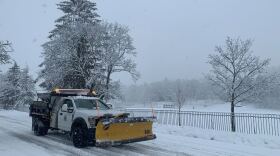The state is testing a new way to keep beavers from clogging up culverts and flooding roads.
Engineers from the Department of Transportation have installed two “"beaver deceivers" on Route 28 in Londonderry, just east of Manchester-Boston Regional Airport.
For two decades, beavers have been building high dams in two culverts along the busy road and nearby rail trail, causing severe flooding on the road, trail and nearby properties up to three or four times a year.
“These two twin culverts that we've fixed are the most vulnerable culverts that we have and they do the most damage,” says Larry Keniston, an engineer with NHDOT’s rail and transit bureau.
He says beaver deceivers have been effective elsewhere in the state before, but this is one of the first times his department has tried them.
The new deceivers include pipes and filters that prevent flooding by letting the culvert drain, while allowing beavers to stay and build a dam up to a safe height.
“This will end the need for a kill strategy,” Keniston says. “In other words, there won't be any more need for the trapping or killing of a beaver."

The two deceivers themselves cost around $4,800, he says, plus other labor costs - including painstakingly cleaning existing dam materials out of the culverts.
But he says they hope the project will prove worthwhile over the next year.
“If we can keep the water off NH-28 for a year – if we can keep the water off those people’s cellars and driveways for a year without any emergency maintenance – and the beaver is still existing in the watershed, then that’s already paid for itself,” he says.
The long-term problem, Keniston says, is still the high population of beavers in the state – and human development in areas they like to live.
Since beavers are territorial, he says, letting one family stay in an area with a deceiver will only push other families to other unprotected locations.
“Human habitation and what the beavers really want to do there can’t co-exist,” he says. “Eventually, hopefully, everybody will have to have a beaver deceiver, I suppose.”
For now, he says they could prioritize installing deceivers at rail and road culverts in the higher-traffic areas where beavers have caused problems.







